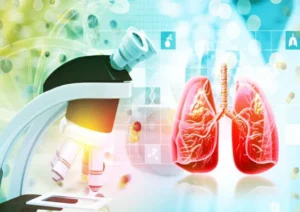Understanding the Last Stage of Lung Cancer:
Symptoms, Care, and Support
Introduction
The last stage of lung cancer, also called stage 4 or metastatic lung cancer, is the most advanced point in the illness.
By this time, cancer has spread from the lungs to other areas like the liver, bones, or brain.
In this article, we’ll go over the symptoms, treatment options, comfort care, and emotional support needed during this tough time.
Symptoms of Late-Stage Lung Cancer
People dealing with the final stage of lung cancer often face severe symptoms, such as:
- Persistent coughing (sometimes with blood)
- Shortness of breath (from fluid buildup)
- Severe chest pain
- Fatigue and weakness
- Unexplained weight loss
- Loss of appetite
- Difficulty swallowing
- Confusion or headaches (if the cancer has spread to the brain)
These symptoms can really affect someone’s quality of life, so managing pain and comfort is super important.
Treatment Options for End.
Even though stage 4 lung cancer is typically considered incurable, treatments are focused on extending life
and making things more comfortable:
1. Palliative Chemotherapy & Immunotherapy

These treatments might slow down cancer growth and help with symptoms but they’re not a cure.
2. Radiation Therapy
This is used to shrink tumors that are causing pain or blockage, especially in bones or the brain.
3. Targeted Therapy
For patients with certain genetic changes, medications like Osimertinib may be helpful.
4. Pain Management
Pain relief can come from opioids, steroids, and other meds to help improve comfort.
Palliative and Hospice Care
When curative treatments aren’t working anymore,
palliative care aims at easing symptoms while hospice care offers support at the end of life. Here are some benefits:
- Pain and symptom control
- Emotional and spiritual guidance
- Help with daily activities
- Support for family members
Emotional and Psychological Support
A lung cancer diagnosis can take a toll on mental health. Patients and their families should look for:
- Counseling or therapy
- Support groups (whether online or face-to-face)
- Spiritual guidance (if that’s important to them)
Preparing for End-of-Life Decisions
Talking about advance directives, living wills,
and DNR (Do Not Resuscitate) orders is key to make sure the patient’s wishes are honored.
Conclusion
The last stage of lung cancer is very tough, but with the right care and support,
comfort and dignity can be improved. Early palliative care, pain management,
and emotional support are vital for both patients and their families.
HOSTINGER HOSTING PLAN DISCOUNT CODE

MVIP77casino feels like a premium experience. From the moment you land on the site, it’s clear they care about quality. The games are top-notch, and the customer service is responsive. You will love mvip77casino.
Getting logged in to 9096betlogin is always a breeze, and that’s a big win in my book. No one wants to waste time struggling with logins. Once you’re in, the games are solid and the experience is smooth. Check it out for yourself 9096betlogin.
Looking for the perfect place to play go88play is the place! Play now for more chance to take some reward at this link: go88play.
Great post, you have pointed out some fantastic points, I likewise believe this s a very good website.
Does your website have a contact page? I’m having problems locating it but, I’d like to send you an email. I’ve got some recommendations for your blog you might be interested in hearing. Either way, great blog and I look forward to seeing it improve over time.
Feeling lucky? I’ve had some decent luck over at Phnice. Worth a shot if you’re looking for a new spot. Give phnice a try.
Alright! Checking out 511bet. Looks like a contender. Good odds and a decent selection of games. Worth a try I think: 511bet
Right, so I saw 511betlogin. Seems like a direct login for something. Anyone know the actual site that uses this as a portal? Find it here though: 511betlogin
Betaobetbr has some pretty cool stuff going on. Found some new favorite games there so far, and the promos are pretty sweet. Give it a whirl. betaobetbr
Hey there! Been messing around on Kuwin1bet lately. Gotta say, the platform is smooth and easy to use. Give it a shot, you might just find your new favorite spot. kuwin1bet
68win29, you’re aight! Depositing was a breeze, and I actually managed to snag a small win the other day. Let’s hope my luck continues! Take a gander: 68win29
Get the Jilibayapp on your phone! Quick access to your favorites and all is well-optimized to be played comfortably on a mobile device. You will get hooked: jilibayapp